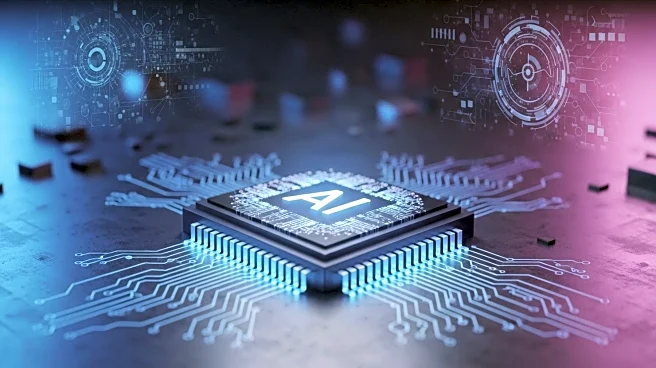What's Happening?
OpenAI has announced a partnership with Broadcom to develop custom AI accelerator hardware. This collaboration involves the deployment of 10 gigawatts of AI accelerator racks to OpenAI and partner data centers, starting in 2026 and continuing through 2029. The partnership aims to integrate OpenAI's frontier models and products directly into the hardware, enhancing capability and intelligence. Although the financial terms of the deal were not disclosed, estimates suggest it could cost OpenAI between $350 billion and $500 billion. This partnership follows OpenAI's recent infrastructure deals, including a purchase of six gigawatts of chips from AMD and a $300 billion cloud infrastructure deal with Oracle.
Why It's Important?
The partnership between OpenAI and Broadcom is significant for the semiconductor industry, as it highlights the growing demand for AI-specific hardware. By collaborating with Broadcom, OpenAI aims to enhance its data processing capabilities, which is crucial for developing advanced AI models. This move could potentially shift market dynamics, as companies increasingly seek custom solutions to meet their AI needs. The estimated cost of the deal underscores the substantial investment required to support AI infrastructure, reflecting the industry's rapid growth and the strategic importance of AI technology in various sectors.
What's Next?
The deployment of AI accelerator racks is scheduled to begin in 2026, marking a significant step in OpenAI's infrastructure expansion. As the partnership progresses, it may prompt other tech companies to pursue similar collaborations to enhance their AI capabilities. Stakeholders in the semiconductor industry will likely monitor the impact of this partnership on market competition and technological advancements. Additionally, OpenAI's ongoing infrastructure deals suggest a continued focus on expanding its technological capabilities, which could lead to further partnerships and investments in the future.
Beyond the Headlines
This partnership may have broader implications for the ethical and cultural dimensions of AI development. As AI technology becomes more integrated into hardware, questions about data privacy, security, and ethical use of AI may arise. The collaboration could also influence long-term shifts in how AI is developed and deployed, potentially setting new standards for AI hardware design and functionality.









